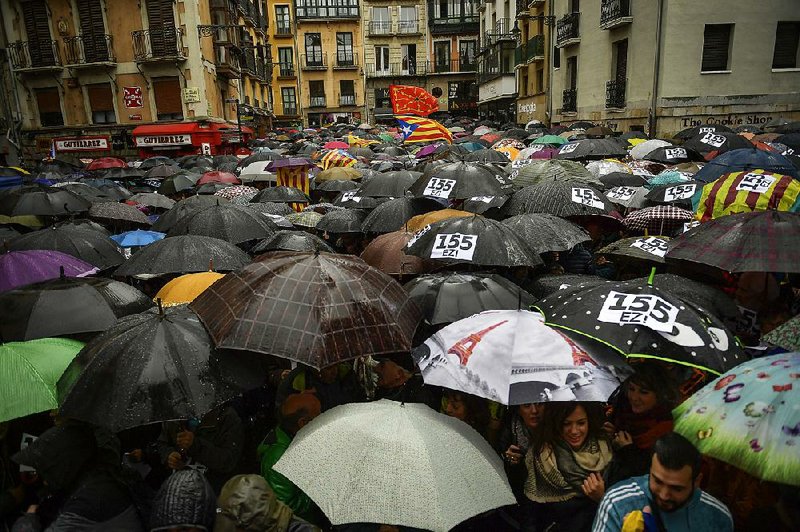BRUSSELS -- Ousted Catalan President Carles Puigdemont and four former Catalan ministers have been conditionally released, the Brussels prosecutor's office said early today, hours after they surrendered to Belgian police.
The five are prohibited from leaving Belgium without the consent of a judge and must also provide a real address and attend all court hearings in person, the prosecutor's office said.
The five former Catalan leaders were taken into custody in Belgium of their own accord Sunday morning, days after Spain had issued European arrest warrants for them.
"They were taken into custody at 9:17 am -- so this morning," said Gilles Dejemeppe, a spokesman for the Brussels prosecutor's office.
The judge had 24 hours from the time of the five ex-leaders being taken into custody to make a decision on how to proceed with executing Spain's extradition request.
The five will have to appear in court where the full grounds of Spain's request for their extradition will be ruled on. Any decision there can be appealed.
Puigdemont and his ministers absconded to Belgium last week, shortly before Spanish prosecutors leveled charges against all 14 members of his deposed government for insurrection against the state, rebellion and misappropriation of public funds.
A Spanish judge issued European arrest warrants on Friday night after Puigdemont and the four former ministers failed to testify Thursday in Madrid at a hearing on criminal allegations linked to their drive for independence in Catalonia.
Hours after Puigdemont and the others surrendered to Belgian authorities, Puigdemont's party put him forward as its leader for an upcoming regional election called by the Spanish government -- meaning he could end up heading a campaign from Brussels while he fights a forced return to Spain.
Spanish government spokesman Inigo Mendez de Vigo has said that any politician can run in the election unless he has been convicted of a crime.
Puigdemont and the four ex-ministers left as the Spanish government, seeking to quash Catalan separatists' escalating steps to secede, applied constitutional authority to take over running the region.
The officials said they wanted to make their voices heard in the heart of the European Union and have refused to return to Spain, maintaining they could not get fair trials there.
Nine other deposed Catalan Cabinet members heeded a Spanish judge's summons for questioning in Madrid on Thursday. After questioning them, the judge ordered eight of them to jail without bail while her investigation continues. The ninth spent a night behind bars before posting bail and being released.
Whether in Brussels or Barcelona, Puigdemont is at the heart of political jockeying for position to start a campaign that promises to be bitter in Spain's worst institutional crisis in nearly four decades.
While parties try to rally support to win back control of Catalonia's regional parliament, pro-secession parties are debating whether to form one grand coalition for the upcoming ballot.
Another former president of the region, Artur Mas, told Catalan public television on Sunday that he backed a fusion of parties for the December vote. But Mas said the main goals of secession supporters must be recovering self-rule and the release of the jailed separatists.
"If we add the issue of independence, we won't get as many people to support us," said Mas, who was the first Catalan leader to harness the political momentum for secession.
Puigdemont and his fellow separatists claimed that a referendum on secession held on Oct. 1 gave them a mandate for independence, even though it had been prohibited by the nation's highest court and only 43 percent of the electorate took part in the vote, which failed to meet international standards and was disrupted by violent police raids.
Catalonia's Parliament voted in favor of a declaration of independence on Oct. 27.
The next day, Spain's central government used the extraordinary constitutional powers to fire Catalonia's government, take charge of its administrations, dissolve its parliament and call the December election.
Hundreds of pro-secession Catalans gathered in towns across the region on Sunday.
"We want to send a message to Europe that even if our president is still in Brussels and all our government now is in Madrid jailed, that the independence movement still isn't finished," 24-year-old protester Adria Ballester said in Barcelona.
Information for this article was contributed by Nebi Qena, Alex Furtula and other staff members of The Associated Press.
A Section on 11/06/2017

